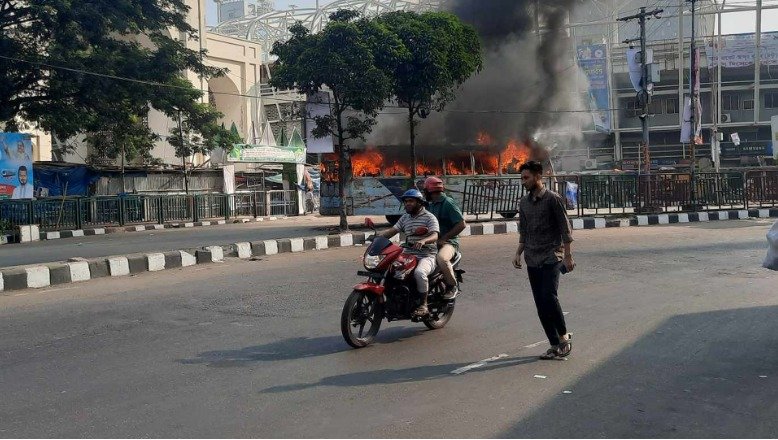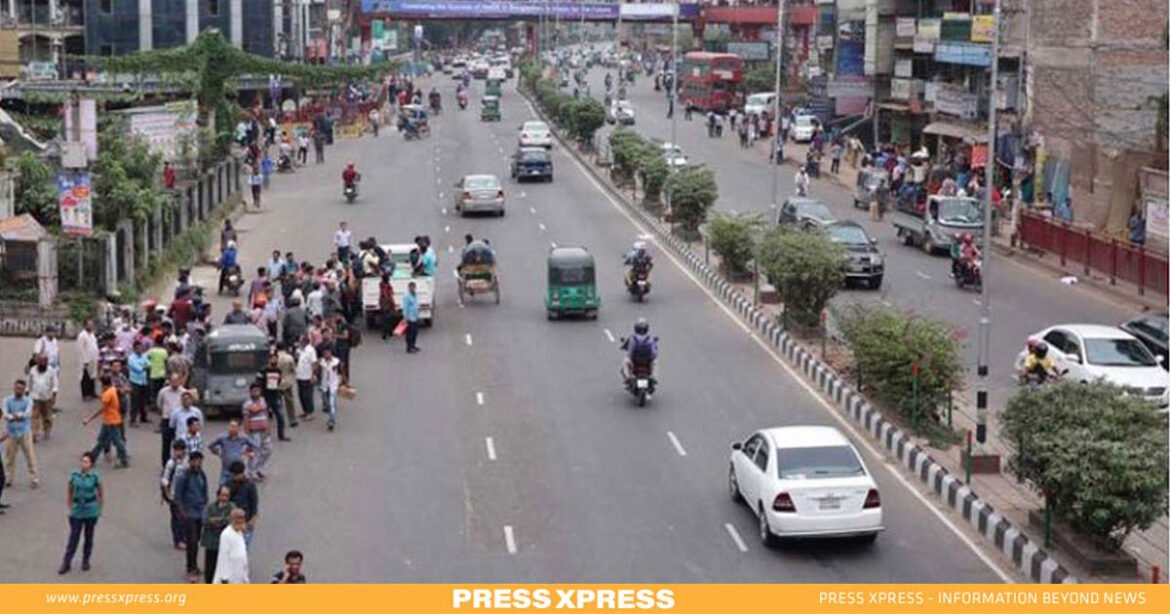After a long hiatus, BNP-Jamaat alliance again brings back devastating hartal in country that could significantly pose grave risk of altering speedy developments and immense suffer to common people.
BNP and Jamaat-e-Islami have declared a countrywide dawn-to-dusk hartal for Sunday (29 October) after their respective grand rallies on Saturday.
Law enforcement agencies dispersed the BNP-Jamaat activists as the rallies took a violent turn, leaving one policeman died and many more injured.
As the country progresses fast, hartal has largely lost appeal to people for its destructive nature. Most of the hartals in recent years hardly achieve objectives because of non-cooperation of the masses.
Defying BNP’s movement, the Dhaka Road Transport Owners’ Association has decided to operate buses on all routes.
The association said that traffic flow will remains normal but they fear off arson attack and vandalism as several buses, ambulances and private cars were burnt to ashes during BNP’s citywide mayhem.
However, fear of sabotage attack by BNP-Jamaat men may bar people to operate daily business incurring thousands of crores taka in a single day.
While Bangladesh drive in full gear on the rocky roads of developments, such collateral destructive strikes may inflict huge damages in efforts to thrive country’s economy.
Hartal Bleeds Economy
Hartal force a grinding halt or total shutdown in productive activities like transportation and production in industries and inflict damage upon the government and disrupt administration.
Due to disruption in transportation, commodities and industrial raw materials cannot be carried to destinations, workforce cannot move from place to place and wheels of industries cannot rotate in full gear.
Hartal callers often resort to vandalism, damage of private and public property and even killing innocent lives to force people to remain indoors to make hartals ‘successful’. Against this backdrop of massive destruction of public property and loss of lives during hartals, the issue of banning hartals was frequently raised from different corners.
Small businesses, daily laborers and commuters mostly bear the brunt of shutdown caused by hartals. Hartal can tally significant loss on economy, incurring billions of taka in a single day.
In 2013, 2014, 2015, Bangladesh witnessed series of hartals, blockades that paralyzed economy even killed hundreds of innocent peoples.
According to an assessment, Federation of Bangladesh Chambers of Commerce and Industries (FBCCI) said each day hartal in 2013 impacts worth USD 1.3 billion losses on economy.

The ready-made garments (RMG) sector, a key export industry, bore the brunt with daily losses reaching Tk 600 crore. Other sectors, including non-export businesses, labor, shopping malls, grocery markets, and casual laborers, collectively incurred losses of approximately Tk 500 crore on a single strike day.
Researchers have found alarming losses in the RMG sector due to political turmoil and overseas customers have annulled their orders for uncertain deliveries. They have found a hostile significant economic and statistical impact of haratals on exports of firms. They also have found that firms’ exports drop by 6.6% on haratal day and firms tackle the pause deferring the exports by a number of days.
Impact of 2013 hartals and blockades on food security situation of vulnerable poor has shown that the means of support of municipal diurnal income recipients were more instantaneously affected by hartals and blockades than those of diurnal income recipients in rural areas
Prime Minister Sheikh Hasina at a speech delivered in national parliament said that 52 days of hartals in 2015 have caused a loss of over Tk1.2 trillion to the country.
She said 1,173 vehicles were torched and vandalised by the blockade supporters, who also set fire to six launches and carried out subversive acts on trains for 25 times in 2015.
There are various transmission channels through which hartal impacts on the economy. The tracking process is based on micro-evidence of impact of shutdowns on economic growth observed over the early months of 2013. Three primary channels were identified: transport disruption, property damage and uncertainty.
Political Stability behind Bangladesh’ Economic Miracle
A country previously hamstrung by chaos, Bangladesh has now been politically stable since 2009, under present Prime Minister Sheikh Hasina whose Awami League is in control of Bangladeshi Parliament for the third time in a row.
At the general elections conducted on December 30, 2018, Sheikh Hasina’s ruling alliance won landslide victory.
Her Awami League won 288 out of 300 seats – 96 percent in Parliament. She is now serving her third consecutive term.
Stability has been the major driving force in propelling Bangladesh to new heights.
From a country of food deficit, Bangladesh has today become a country of food surplus, thanks to the uninterrupted supply line and seamless connectivity.

So to speak, Bangladesh is the world’s fourth largest rice producer, the fifth largest vegetable producer, the eighth largest potato producer and the fifth biggest producer of freshwater fish, thanks to its network of rivers.
It is not only a country of food surplus but also an exporter of agriculture products.
Bangladesh also has an advanced pharmaceutical industry amounting to US $3 billion.
As an industry which is mostly homegrown, the Bangladeshi pharmaceutical companies manufacture high quality products including effective anti- cancer drugs, to be exported to 151 countries across the globe including Sri Lanka.
Through the extraordinary social, economic management and strong political leadership of Prime Minister Sheikh Hasina, Bangladesh is now achieving 7% average GDP (gross domestic product) growth, crossing the international standard line of the Lower Middle-Income threshold in 2015.
The country’s economy has consistently achieved robust growth, driven by a booming textile industry, exports, and a growing manufacturing sector.
All these gains were made possible mainly because of stability coupled with policy consistency.
Investors look to Bangladesh because of a myriad of factors, and political stability features high among them.
But in light with current political destabilization attempt by BNP-Jamaat activists, business leaders and economists on Saturday have expressed concern that the growing political instability in the country in the lead-up to the upcoming national polls could disrupt industrial production and trade.
They have warned that if the political unrest escalates, it will exacerbate the crisis in the country’s business, commerce, and in the overall economy.
They have urged political parties to avoid pursuing policies or programmes that could negatively impact the economy.


